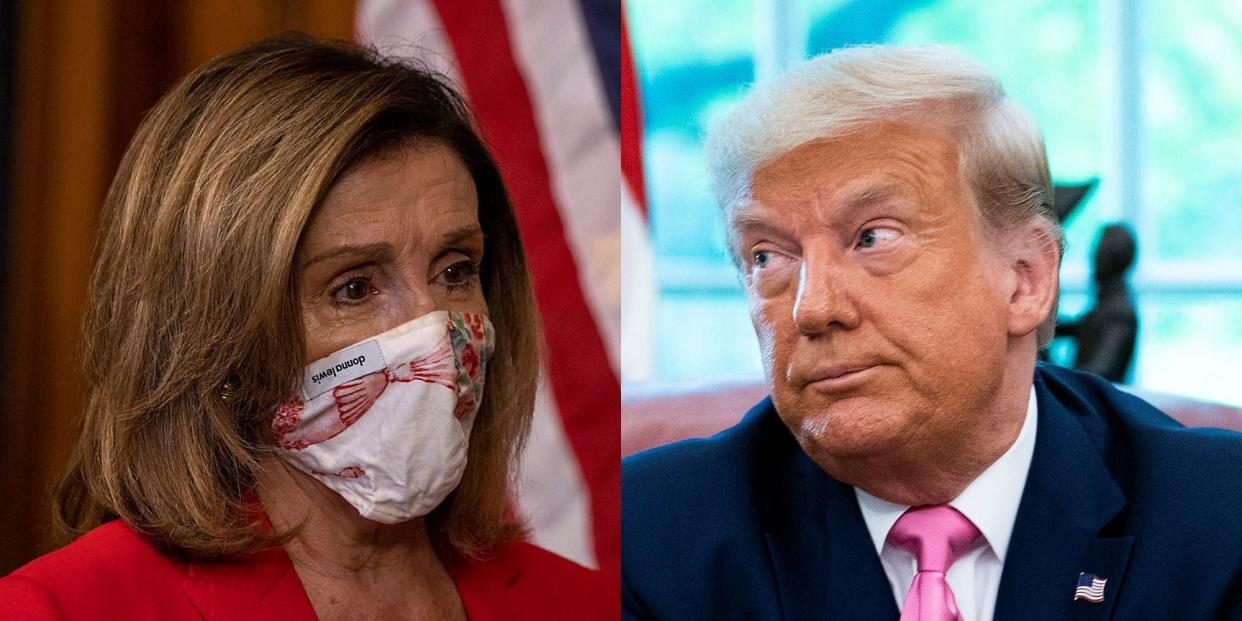Trump repeats 'mad theory' about Nancy Pelosi becoming president if 2020 election result delayed

Donald Trump repeated a "mad theory" on Friday that Nancy Pelosi would become president if an election result was delayed due to mail-in voting.
As House Speaker, Ms Pelosi is second in line to the presidency behind Mike Pence. The theory posits that Ms Pelosi would ascend to the White House if a new president has not been inaugurated by the end of Mr Trump's term at noon on 20 January, as required by the 20th amendment.
Amidst a battle over universal mail-in voting, Mr Trump said at the 2020 Council for National Policy that widespread vote-by-mail ballots could lead to delays of weeks, months, years or "maybe never".
"And I don't know what's going to happen. You know there's a theory that if you don't have it by the end of the year, crazy Nancy Pelosi would become president. You know that right," Mr Trump said.
"Think of that. That mad theory too. You've heard that theory. Now I don't know if it's a theory or a fact but I said, that's not good."
Mr Trump added: "That's part of their whole act, that if you don't have a choice that the speaker of the House becomes president and I think that goes into effect either on the 20th or the 1st. And put that in the hopper, add that to everything else. It's a disgrace. They know it's filthy, dirty."
The theory first emerged in July after Mr Trump suggested a delay to the election until after the coronavirus pandemic had passed so people could vote safely in-person. The hashtag "President Pelosi" trended across Twitter, Instagram and Facebook, with Republican Senator Lamar Alexander repeating the theory to CNN reporter Kristin Wilson.
If the president doesn't get re-elected or vacate by Inauguration Day (1/20/21), the Speaker of the House would serve as acting president.
That means President Nancy Pelosi https://t.co/bDu1jcbDqz— The Betches Sup (@Betches_Sup)
Twitter blocked the original tweet behind a misleading warning label, pointing to a USA Today fact check of the theory that rated it "false" based on Ms Pelosi herself leaving office on 3 January if no election goes ahead.
The 20th amendment of the US Constitution says the president and vice president must leave office if no successor has been chosen by the end of their term on 20 January.
While the Presidential Succession Act of 1947 determined that the next in the line of presidential succession is the speaker of the House, the Constitution also places an end date on Pelosi's term at noon on 3 January.
If Ms Pelosi is not re-elected due to a delayed vote, the next in line to assume the office of president would be the "President Pro Tempore" of the Senate, who is currently Republican Chuck Grassley of Iowa.
If no election was held, however, the 22 Republican Senate seats up for re-election would remain vacant, giving Democrats the majority and allowing them to elect a new President Pro Tempore - who would then become president.
But that line of presidential succession is based on the premise that the election would be delayed beyond 20 January, rather than Mr Trump's latest suggestion that if the election goes ahead with widespread mail-in voting the results would not be known until after the deadline.
If the election goes ahead and Ms Pelosi is re-elected with results certified before her 3 January deadline, while presidential election results are not certified until after Mr Trump's 20 January deadline, the "mad theory" is that she could be placed in the White House.
"What's going to happen when you have 150 million votes and you have 51 million, 51 million votes, think of it, they're going to send out 51 million, it could be higher than that, 51 million votes, no signature verification on many of them," Mr Trump said on Friday.
"The other thing is if you do this you'll never have an election count on November 3rd... You're not going to be able to know the end of this election, in my opinion, for weeks, months, maybe never, maybe years but maybe never, because once you go past the first week you're never going to know."
Read more
Head of USPS says he will not reverse changes which caused delays
Pelosi to call House back into session to vote on Postal Service bill
2020 election: What you need to know about mail-in, absentee ballots
Trump backtracks on mail-in voting, contradicting press secretary

 Yahoo News
Yahoo News 
